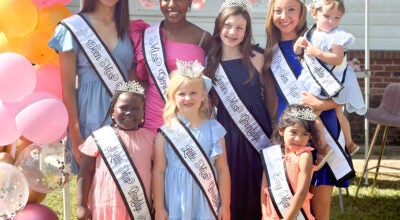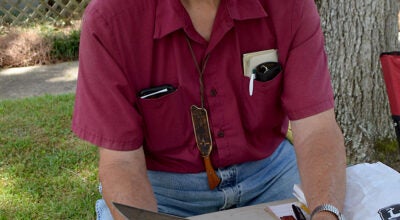Brundidge Library hosts ‘Hey, Boo’ program
Published 2:00 am Friday, October 16, 2015

MESSENGER PHOTO/JAINE TREADWELL
Larry McLeod was one of those at the “Hey, Boo” program at the Tupper Lightfoot Memorial Library in Brundidge Thursday who believes that Harper Lee’s “Go Set a Watchman” should not have been published. He makes his point to Theresa Trawick, head librarian.
Not everyone who attended the “Hey, Boo: Harper Lee” program and brown bag lunch at the Tupper Lightfoot Memorial Library in Brundidge at noon Thursday was in agreement about the novel that tallied more presales than any book in its publisher’s history.
“Go Set A Watchman” by Harper Lee is the sequel to “To Kill A Mockingbird,” which won the Pulitzer Prize and has become a classic of modern American literature. “To Kill A Mockingbird” is filled with warmth and humor but deals will serious issues of rape and racial inequality and was published in 1960.
In 2015 HarperCollins announced that the manuscript of “Go Set A Watchman” had been rediscovered and Harper Lee’s second novel was published in July 2015.
Theresa Trawick, Tupper Lightfoot Memorial Library head librarian, showed a video with clips of Harper Lee and testimonials from notables including authors, Mark Childress and Lee Smith, and TV personality Oprah Winfrey.
Larry McLeod was among several who said he wished “Go Set A Watchman” had not been published.
“‘To Kill A Mockingbird’ is a classic,” he said. “Nothing can touch it. There was no need for a sequel. It was enough. I thought the movie was a classic, too.”
Sarah Bowden agreed that “To Kill A Mockingbird” is a stand-alone novel.
“Harper Lee is one of us,” she said. “She is an Alabama author who has written a novel that is read worldwide. When we were in England, ‘To Kill A Mockingbird’ was on the shelves of bookstores there. It was enough.”
Ed Hicks said Ernest Hemingway said that every author has one story to tell and when it’s that good, stop.
Many in the group agreed that Harper Lee was right to stop writing with “To Kill A Mockingbird.”
The book was set in a small rural Alabama town during the 1930s, when Scout was young and innocent and held her dad and attorney, Atticus Finch, in high esteem, Trawick said. “The two best words in the book are ‘Hey, Boo,” she said. “That tells the story in two words.”
Boo Radley is a recluse who is a symbol of goodness. He is an example of the threat that evil poses to innocence and goodness.
Orprah Winfrey shared her attempt at an interview with Harper Lee.
“She said that she is Boo Radley,” Winfrey said. “She refused the interview. I understood.”
Some members of the lunch group shared thoughts that Harper Lee was reclusive and that she, too, was a victim of lost innocence, as all children are at some time in their lives.
“In ‘Go Set A Watchman’ Jean Louise comes home from New York to find that her father’s views have changed. She has spent her life looking up to him and has always been in agreement with his ideals and opinions. That is no longer true and she is angry and screams at him for his “new” ideals and prejudices.
Jean Louise has to come to grips with the fact that she has become prejudiced herself.
The destruction of her childhood memories is painful as it is to all of those who experience similar destruction, Hicks said.
The consensus of those who attended “Hey, Boo” was that Harper Lee wrote at great American novel that touches on social and moral issues that are prevalent today and will be tomorrow and all the morrows forward. It is a classic. The squeal will have its place in American literature, if only as the sequel to “To Kill A Mockingbird.”





